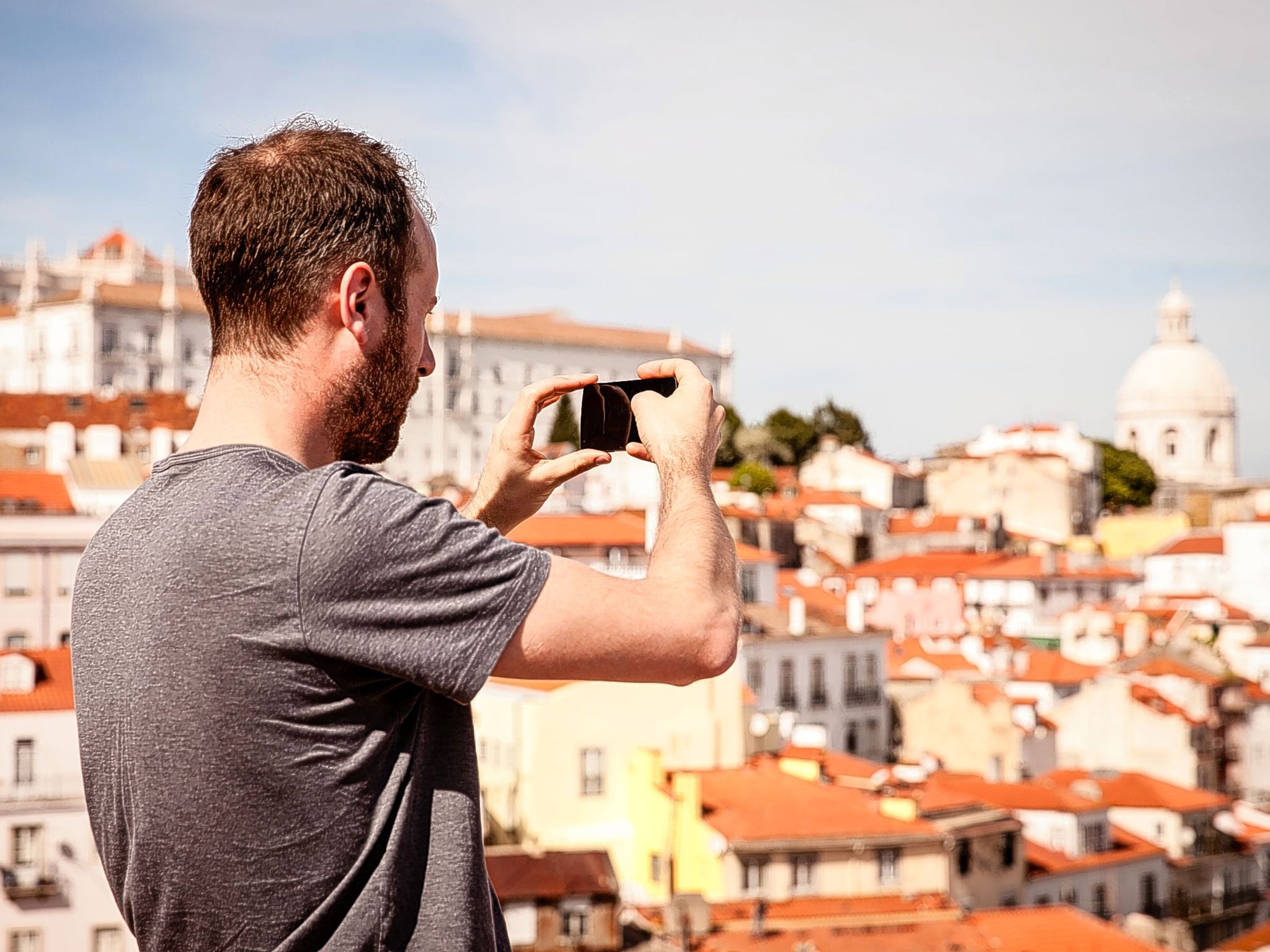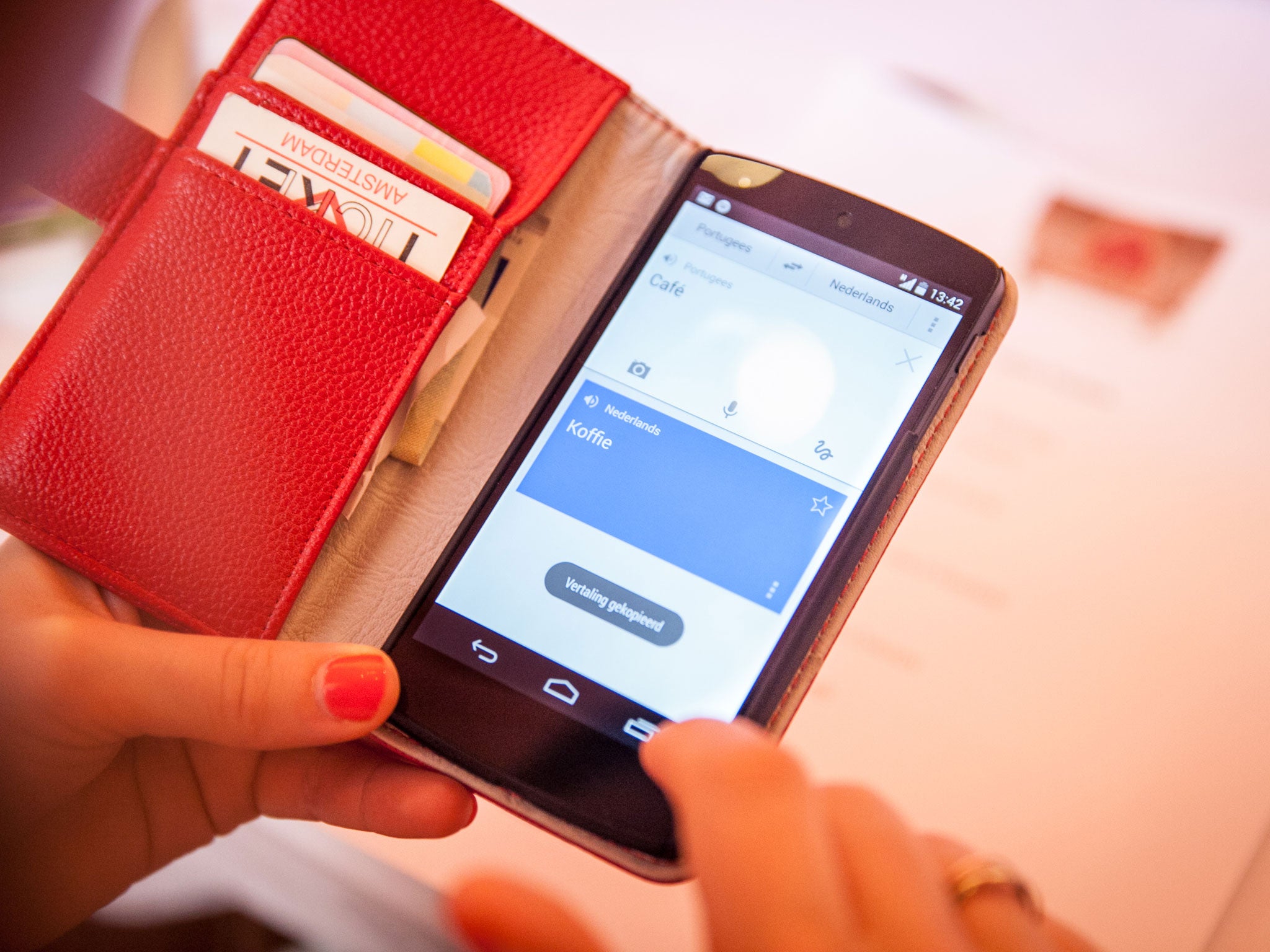Tourism technology: How to enjoy a roaming holiday
This summer, data charges get cheaper for travellers within the the EU – and that means a chance to discover just how far tourism technology has come. Simon Usborne explores Lisbon with a smartphone as his guide

Your support helps us to tell the story
From reproductive rights to climate change to Big Tech, The Independent is on the ground when the story is developing. Whether it's investigating the financials of Elon Musk's pro-Trump PAC or producing our latest documentary, 'The A Word', which shines a light on the American women fighting for reproductive rights, we know how important it is to parse out the facts from the messaging.
At such a critical moment in US history, we need reporters on the ground. Your donation allows us to keep sending journalists to speak to both sides of the story.
The Independent is trusted by Americans across the entire political spectrum. And unlike many other quality news outlets, we choose not to lock Americans out of our reporting and analysis with paywalls. We believe quality journalism should be available to everyone, paid for by those who can afford it.
Your support makes all the difference.You are probably familiar with the sense of foreboding that arrives with a post-holiday phone bill. If, like me, you have the pleasure of forwarding a significant portion of your salary to O2, you may also be able to picture the string of texts you fire from your smartphone while emailing or sharing not very good photos abroad, repeatedly shouting the request for "MOREDATA".
No more! Or at least, not so much. Our friends in Brussels have responded to growing disquiet about the prohibitive cost of data while travelling – or "roaming", as it's known in telecoms circles – by demanding a change to the law. In July, just in time for the summer holiday rush, charges for being online in the EU will drop by more than half. From December next year, mobile data use should cost you no more than it does at home.
Great news for tourists. According to a European Commission survey, a quarter of us go so far as to switch off our phones entirely when leaving Britain, such is our fear of being done for data. The rest of us tend to dive straight into our settings to disable roaming, effectively taking the smart out of our smartphones. Those who dare can expect to be told, as I have been, that our "daily" data allowance has run out after half an hour. "MOREDATA," you text – again.
Europe's mobile-phone companies seem to do pretty well, financially, but warn that they might increase all our bills to cover the cost of obeying the new law. Competition may keep any such hikes to a minimum. In the meantime, cheap data is a boon for the tech companies, who would like us to keep our phones on, so that they can carry on with the lucrative business of organising our lives.
Step forward Google, which earlier this month invited 50 journalists from across Europe to experience a digital life without fear, where connected tourists roam free. Each would be equipped with a Google Nexus 5 smartphone stocked with Google apps and (because the law hasn't changed yet) a bottomless SIM card. We would be joined in almost equal number by an army of chipper Googlers, as the company's 50,000 employees are known.

The laboratory for this experiment: Lisbon, a city I had never visited. I had no idea what to do, how to get around, or how to speak a word of Portuguese; I would need all the assistance I could get. Google gives me a head start by booking flights and a hotel (the sleek and central Figueira, on the square of the same name). Emails confirming both reservations arrive in my Gmail inbox. This is where things got clever.
Google Now is the company's newish digital personal assistant. It draws on your inbox, your use of maps and your search habits to tell you what it thinks you need to know, when you need to know it. It can be a bit alarming at first. So, for example, on the day of my flight to Lisbon, an alert pops up telling me to go to the airport and how to get there, with regular updates of the flight's status. I never told Google I was going to Lisbon, but it found those relevant emails and extracted the relevant details.
When I land two hours later, my phone knows I'm in Lisbon. But it also knows where I'm staying (from the email, again) and tells me how to get there. I click on the Now "card" that has flashed up with the journey information, and switch from driving directions to public transport. And on I go down to the Metro. Nine stops on the red line to Alameda, then nine stops on the green line to Rossio for a three-minute, guided walk to my hotel. Transfers were never this easy.
If you don't mind looking and sounding a bit silly in public, you use your voice to search for anything you might otherwise type, but Google is also multilingual. At the Cervejaria Trindade restaurant, which I find very easily using Maps, I use my phone to take a picture of the menu via its translate app. I then stroke my finger over the screen, across the words I don't understand – torta de cenoura – and immediately get a translation – "carrot pie" (I guess it means cake).
I skip the carrot course and go it alone, in search of an ice-cream shop, where I test a different translate function. Still using the translate app, I employ my phone as translator and tell it, "I would like a cone, please, with chocolate and coffee ice cream." Immediately my phone speaks to the man behind the counter in his language: "Eu gostaria que o cone satisfeito com chocolate e sorvete de cafe." I still have no idea whether this is good Portuguese, although Google, translated the other way later, suggests I have said: "I would like the cone satisfied with chocolate and ice-cream café." Close enough? He could reply in Portuguese, but instead, having heard my initial, English request, he fixes my ice cream with a third scoop of bemusement and packs me on my way.
What's striking about all this is the refreshing absence of paper. No telltale Lonely Planet, no tatty hotel city map – just me and a phone, like at home. To take this approach further, Google is trying to digitise and educate the guidebook. Its Field Trip app draws on material from publishers to tell me where to go and what I'm looking at. As I walk through the delightful Carmo Square to the top of the lift, I feel a buzz in my pocket. My phone wants to tell me about Carmo Convent, a ruined church on the corner. A note pops up from a very enthusiastic man called Claudio, who contributes to a website called Spotted by Locals, telling me, among other things, that, "Once you enter, you will be enchanted by the view of the nave of the church. I always am!"
I also don't hold back in using my phone to capture Lisbon on a beautiful day. With the device set to back up my photos to my Google+ account, each image goes straight to my own little cloud as I snap, which means I could lose the phone without losing my photos. I later discover that the "auto awesome" function has stitched pictures I took of the city's skyline into a panorama. Clever (don't tell the Googlers, but I'm still working out how to share the images on Facebook, as I don't know anyone who uses Google+).
I could go on, such is the daunting breadth of Google's offerings. I'm ultimately impressed, but there are things to consider, even for technophiles who welcome the new freedom to roam. Smartphones should make it easier for us to look up on holiday rather than at a screen, which I certainly do enough of at home. Also, battery life only seems to get worse (I had to rely on charging packs to keep things going). My advice: embrace the new laws, but don't ditch your guidebook just yet.
Join our commenting forum
Join thought-provoking conversations, follow other Independent readers and see their replies
Comments